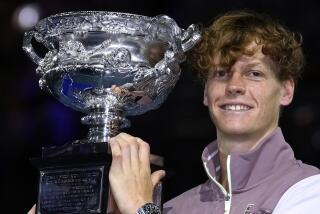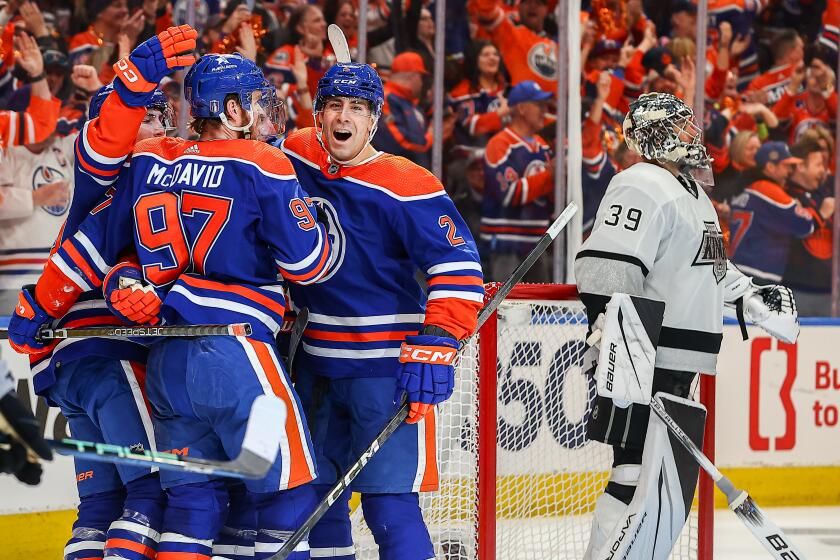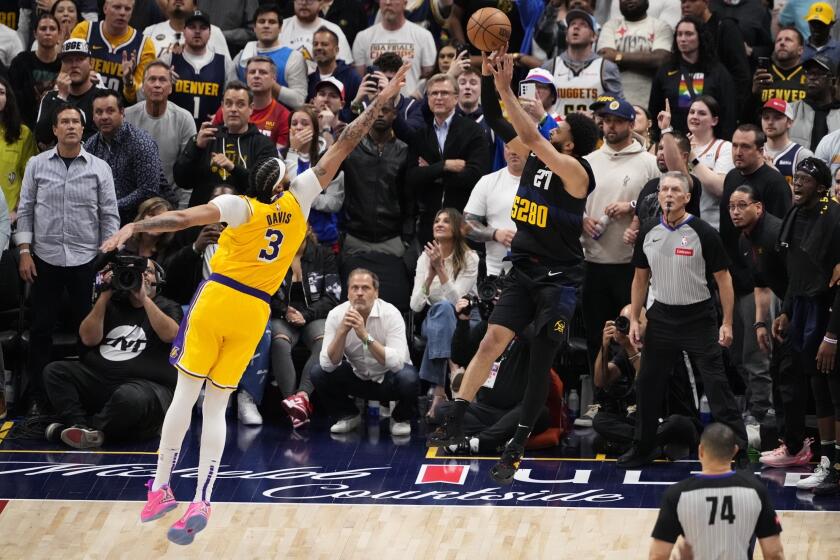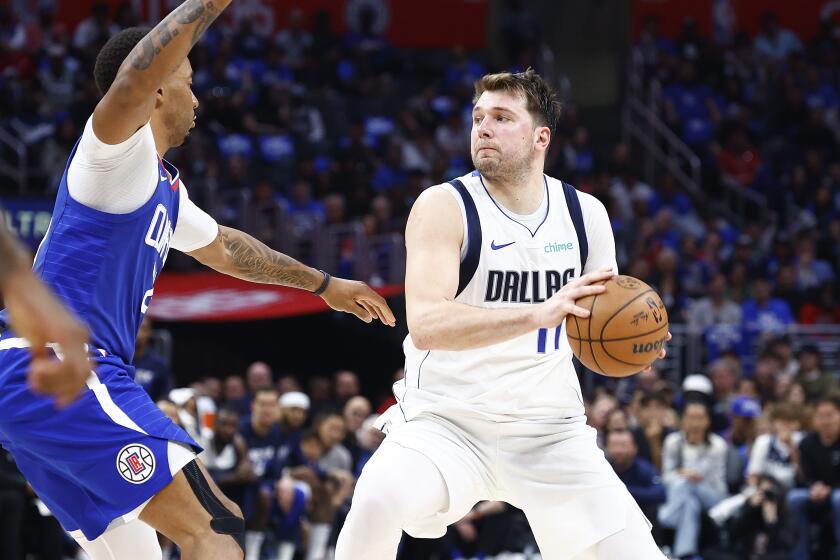With Andy Murray, the sum is greater than the parts
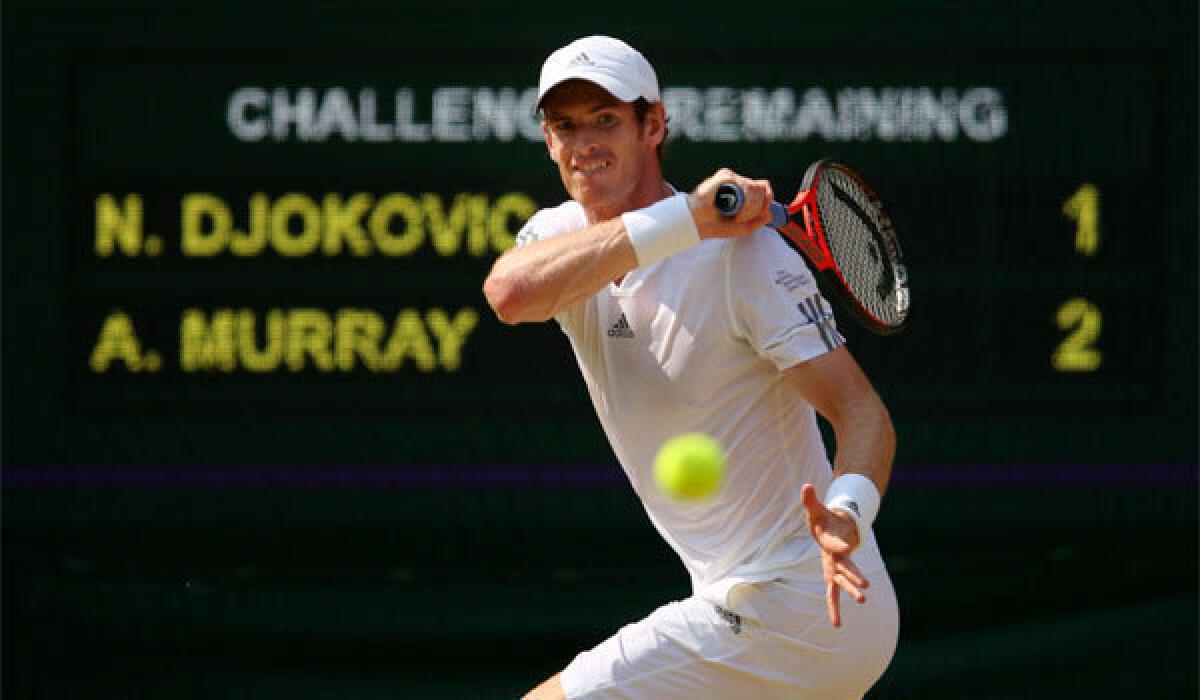
Perhaps the most distinctive thing about our new Wimbledon champion, Andy Murray, is that there is little distinctive about him.
Sure, he is a great tennis player. You don’t roll out of bed and win Wimbledon.
But there is no Andre Agassi swagger, no Pete Sampras silky service motion. Roger Federer walks onto the court and you see an international diplomat and a magic-wand forehand. Rafael Nadal stands at the service line, tugs at his pants, eyes the sucker across the net and prepares to take 200 balls hit at him by hitting 201 back.
Even Novak Djokovic, the Serb who was Murray’s straight-set victim Sunday, had a persona before he had great success. One year, during a delay at the U.S. Open, he did hysterically funny imitations of John McEnroe and Maria Sharapova. He soon toned down the clown stuff and now is No. 1 in the world.
With Murray, we are still learning about him, discovering him. After what he did Sunday, especially persevering in a magnificent final game in which he lost three match points and never crumbled, it is clearly worth the effort.
One thing we know for sure. He started the match with each shoulder carrying the weight of several million Brits and finished weighing his normal 185 pounds. After these 77 years, many in Britain justifiably feared that Fred Perry’s 1936 legacy had become an impossible-to-lift dead weight.
But then, Djokovic’s final backhand settled into the net. Atlas had shrugged. All those British stiff upper lips finally quivered.
The desperation had ended. The hill outside the stadium with the big screen, the one the Brits named Henman Hill in their pipe dream that the popular but short-on-title-talent Tim Henman would be the one to bring them Wimbledon glory, erupted in frenzied relief.
Murray has gone from hope to hero to eventual knighthood. Although, showing good common sense, he immediately poured cold water on that idea. Knighthood is for people who have done something very good for very long, he said.
For years, he was mostly a guy born at the wrong time, coming onto the scene when Federer, Nadal and Djokovic were getting entrenched. He was No. 4 in the rankings, as well as in the minds of fans.
Most players see No. 4 as lofty achievement enough, and soon, satisfied with that, become No. 12 and on to No. 56. Murray kept looking only upward, with the full knowledge that, by continuing to do so, he would have no life, only pressure. Then to succeed — knowing full well that the only thing worse than a disappointed Brit sports fan is a disappointed Brit sports fan who writes headlines for a tabloid newspaper — is an incredible feat.
That the son of Will and Judy Murray of Dunblane, Scotland, would be the chosen one is a truly long-odds wager.
At age 8, he survived the horror of the 1996 Dunblane school massacre of 17 — 16 of them children — by hiding in the headmaster’s office. His class was en route to the gymnasium when the shooting began. He was just steps away from being a victim.
He got his feisty competitive nature from being beaten in tennis often by his older brother, Jamie, who is now his frequent doubles partner.
He even progressed successfully through the early stages of a junior tennis career while unknowingly playing with a painful kneecap that had never fused. That is called a bipartite patella and he didn’t have it repaired surgically until he was 16. That was only a year before he became the youngest Briton ever to play in a Davis Cup match and two years before he was to climb all the way to No. 65 in the world.
Also, only 10 years before he won Wimbledon.
Neither Murray’s game nor his personality is as bland as it seems.
He appears to have no distinctive weapon, because his entire game constitutes one huge one. The serve is big, the ground strokes off both sides are big and his movement is deceptively smooth and quick. He lands few big knives to the opponent’s heart, just hundreds of sharp needles. He is good, smart and athletic and just recently — probably beginning with his gold-medal victory over Federer in the London Olympics last summer — started believing that.
The future will be interesting. Federer will probably fade, Nadal will probably play a limited schedule because of his knee issues, and Murray and Djokovic might just give us many reprises of Sunday.
It will also be fun to see how much Murray’s dry British wit boosts his persona, as people start to get it. When the queen of the Wimbledon post-match interview, Sue Barker, suggested that the final game had been torturous to watch for the crowd, Murray volleyed back.
“Imagine playing it,” he said.
A short time later, TV cameras followed him through the venerable clubhouse as he shook hands, signed autographs and finally ended up on a balcony, waving to the crowd below.
If a chimney had been nearby, Wimbledon could have unleashed some white smoke.
Pope Andy had arrived.
More to Read
Get our high school sports newsletter
Prep Rally is devoted to the SoCal high school sports experience, bringing you scores, stories and a behind-the-scenes look at what makes prep sports so popular.
You may occasionally receive promotional content from the Los Angeles Times.

